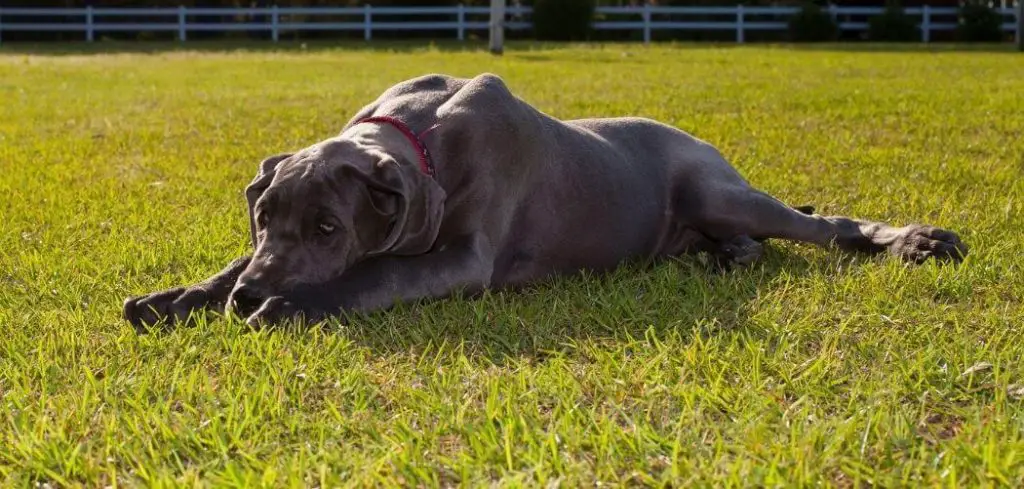It can be distressing to watch a dog constantly eating grass and then throwing up. While many dogs occasionally nibble on grass without problems, repeated grazing followed by vomiting is more concerning.
We outline the common reasons dogs may constantly eat grass and throw up, what you can do at home, and when to seek veterinary help.
Table of Contents
Dog Constantly Eating Grass and Throwing Up — Why It Happens
Dogs may constantly eat grass and throw up for several reasons, ranging from stomach irritation to underlying health conditions. Some dogs eat grass to induce vomiting when they feel nauseous, while others may have gastrointestinal upset, dietary deficiencies, or parasites contributing to the behavior. In other cases, issues such as acid reflux, pancreatitis, or even anxiety may play a role.
Because the behavior is persistent and results in vomiting, it often signals a more serious concern than casual grass chewing.

Dog Constantly Eating Grass and Throwing Up: Common Causes
Gastrointestinal Upset
When a dog’s stomach feels unsettled due to indigestion, food intolerance, or mild infection, they may instinctively eat grass.
The rough texture can trigger vomiting, providing temporary relief. However, constant repetition indicates that the underlying cause of nausea remains unresolved.
Owners may also notice drooling, lack of appetite, or abdominal discomfort alongside the grass eating.
Read more: Dog Eating Grass and Dirt (Why it happens)
Dietary Deficiencies
Some dogs may seek out grass if their diet lacks fiber or key nutrients. By consuming grass, they may be trying to supplement what is missing in their food.
However, the fibrous material can be hard to digest, leading to vomiting. Dogs with nutritional deficiencies may also show signs like dull coats, low energy, or irregular stools.
Parasites
Intestinal parasites such as roundworms, hookworms, or giardia can cause nausea, abdominal pain, and erratic appetite.
Infected dogs may eat grass excessively and vomit as a result. Additional symptoms may include diarrhea, visible worms in the stool, bloating, or weight loss.
Parasites are especially common in puppies or dogs not on regular deworming schedules.
Acid Reflux or Gastritis
Acid reflux occurs when stomach acid irritates the esophagus, making a dog feel nauseous.
Eating grass may be an instinctive attempt to alleviate discomfort, but it often leads to vomiting instead.
Gastritis, or stomach lining inflammation, produces similar symptoms. Dogs with reflux or gastritis may also lick their lips excessively, pace restlessly, or appear uncomfortable after meals.
Pancreatitis
Pancreatitis, or inflammation of the pancreas, is a painful condition often triggered by eating fatty foods.
Dogs with pancreatitis may experience nausea, vomiting, and abdominal pain. They might eat grass in an attempt to feel better, but vomiting usually follows.
This condition can become life-threatening and may also cause lethargy, dehydration, and diarrhea.
Anxiety or Behavioral Issues
Some dogs develop compulsive grass-eating behaviors linked to stress, boredom, or anxiety.
When this is combined with vomiting, it can be difficult to determine whether the root cause is psychological or medical. Stress-induced behaviors may also include pacing, whining, or destructive chewing.
What to Do If Your Dog Is Constantly Eating Grass and Throwing Up
If a dog is persistently eating grass and then vomiting, it is important to take proactive steps at home while monitoring their health.
Start by reviewing their diet to ensure it is balanced and complete. Switching to a high-quality food rich in fiber may help prevent nutritional gaps that drive grass eating.
Make sure your dog is on a regular deworming and parasite prevention plan, as parasites are a frequent hidden cause. Keeping dogs on a consistent feeding schedule and avoiding fatty table scraps can also reduce gastrointestinal upset.
Provide enrichment activities, regular walks, and stress relief to curb anxiety-driven grass eating. Puzzle feeders, chew toys, and structured play can help redirect the behavior. Ensure your dog has access to clean water at all times, as dehydration can worsen nausea.
While minor grass nibbling may not be concerning, constant vomiting is a red flag that should not be ignored.
When to Call or Visit Your Vet
If a dog vomits repeatedly after eating grass, veterinary care is essential. Persistent vomiting can quickly lead to dehydration and electrolyte imbalances. If the vomit contains blood, bile, or worms, seek immediate veterinary attention.
Other warning signs include diarrhea, lethargy, loss of appetite, abdominal pain, or weight loss. Dogs with a history of pancreatitis, acid reflux, or other chronic conditions should always be evaluated promptly when vomiting occurs.
In some cases, diagnostic tests such as bloodwork, stool analysis, or imaging may be needed to identify the cause. Early treatment often leads to better outcomes and prevents complications.
Read more: Dog Eating Grass Frantically Middle of Night (What it means)
Key Takeaway
A dog constantly eating grass and throwing up is not just a quirky habit—it often signals an underlying health issue. While occasional grazing is common, frequent vomiting requires attention.
Ensuring a balanced diet, preventing parasites, and supporting digestive health at home can help, but veterinary evaluation is the safest step when symptoms persist.
By acting early, owners can protect their dog’s well-being and address the root cause of this concerning behavior.
